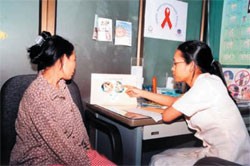
Challenge
Cambodia has one of the highest HIV/AIDS infection rates in the world. There is great concern that the HIV/AIDS epidemic is moving from sex workers to family members, especially housewives who are unaware that they are at risk of being exposed to HIV. With an increasing number of adults infected with HIV/AIDS, there is a growing population of AIDS orphans left to the care of relatives or state institutions. With little opportunity for education or proper care, many orphans are destined to live in poverty and could ultimately become infected themselves. This widespread proliferation of HIV/AIDS into the general population will continue to limit social and economic development efforts unless its spread is slowed.
Initiative
In an effort to take the fight against HIV/AIDS to the family, USAID has funded the Reproductive Health Association of Cambodia (RHAC) to run a voluntary counseling and testing (VCT) program.
By providing counseling to those being tested for HIV/AIDS, the USAID-funded program is not only reducing infection rates and risky behavior by raising awareness, but also disseminating educational messages on reproductive health issues to families throughout the country.
The program encourages infected people to seek help at HIV/AIDS care centers. If a test result is found to be positive, the patient is referred to an HIV/AIDS care center for advice, health care services, and treatment.
Results
Over 22,400 clients have received access to HIV/AIDS testing awareness counseling through the program, including over 7,200 housewives. In addition to changing behavior through health education, the USAID-funded voluntary confidential counseling and testing program is also addressing cultural beliefs that have served as a barrier to the acceptance of new ideas. Topics that were once considered to be forbidden are now being discussed openly at all levels.
Female clients have said that they feel more comfortable discussing topics such as stress and sexual history with their health providers. In addition, women who participated in the counseling have told counselors that they now are more confident discussing birth control and HIV/AIDS prevention with their husbands.







Comment
Make a general inquiry or suggest an improvement.